- Home
- Janice Kay Johnson
Open Secret Page 2
Open Secret Read online
Page 2
“I know that!” she cried. “I know there wasn’t anything I could have done! But that doesn’t stop me from feeling guilty.”
“So you want to ease your guilt.”
Her cheeks flushed. “You make that sound…reprehensible.”
“No. No, it’s not. I’m just trying to find out what’s most important to you. Do you expect these two strangers to become your sister and brother again? Best friends?”
Her mouth worked for a moment, making him feel like a brute, before she said with dignity, “I would love for them to be my brother and sister. Just that. We’re adults now. Even if we’d grown up together, we might be spread across the country and only see each other once a year. I don’t expect us to…to time-travel, to have a different childhood where we stayed together, if that’s what you’re asking. I’d just like to renew a bond that was very important to me. And…” Her voice went quiet, so quiet, he just heard her. “I’d like to be able to tell them about Mom and Dad. About how loved we were.”
After a moment, he nodded. “All right. I have just two cautions. One is that I want you to realize that, even if we find them, one or both may choose not to have any contact with you. They may feel bitter, or just indifferent. If the adoptions were successful, they may feel no need to explore their birth family.”
“But…wouldn’t they want to know a medical history, at least?”
“Your aunt and uncle may have provided that.”
“Yes…” Her forehead crinkled. “I suppose.”
“We’ll get back to that. First let me offer my second caution, which is simply not to expect too much from your sister and brother. With the best will in the world, they may not fill that emptiness.”
She flushed again. “I really don’t expect them to. I didn’t mean to suggest I did. Only that I was at a low point in my life when I decided to initiate the search. Whether you believe it or not, Mr. Kincaid, I’m a reasonably stable, well-adjusted human being. I have a good job, I own my own home, I have friends, I…” Something seemed to stick in her throat. A lie she couldn’t tell. Had she been going to say, I date?
She spoke with such offended dignity, he half expected her to rise and announce that she wouldn’t need him after all. He saw on her face that she wanted to do just that. He watched her struggle with the desire, then overcome her pride and hurt feelings.
Like the stable adult she’d said she was.
He relaxed slightly.
“If you feel prepared to go ahead, let’s get to the details. What do you know about them? What did you discover? Where do you think you failed?”
She explained what steps she’d taken in her search, guided by a book with which Mark was familiar. Unfortunately, despite her many phone calls and letters, she’d accomplished next to nothing. Her collection of notes was pitifully small. She’d struck out earlier in the quest than he’d hoped.
Her aunt and uncle had placed the children through an attorney in a private adoption—or adoptions.
“They claim not to know whether Lucien and Linette went together or to two different homes,” his client said.
“How do they feel about your determination to find your sister and brother?” he asked.
“They aren’t very happy about it,” she admitted. “Especially my uncle.”
“Which is the blood relation?” It didn’t always matter, but in this instance his gut feeling was that it did.
“My aunt. She’s my mother’s sister. I think she struggles with some guilt at not fulfilling her sister’s trust. She doesn’t say that. She’s always brusque, and insists they did the best they could and that’s that. They didn’t have a big enough house, they had no money, et cetera, et cetera. But I suspect…” She hesitated. “I suspect it was my uncle who put his foot down. I think maybe she had to plead to get him to agree to keep me. I always felt as if he resented me.”
Sounded like a hell of a childhood. Suzanne Chauvin might have been better off if they hadn’t kept her, Mark thought. Except then she would have had to live with the wrenching memory of not being wanted by her own relatives.
Looking again at the notes she’d spread on his desk, she said, “If I could have found out their adoptive names… The problem is, the attorney who handled the adoption is dead. He’s been dead for a long time. No one seems to know what happened to his files. I found his wife in a nursing home, but her memory is shaky and she says he never talked about work. She gave me the name of his secretary, but I couldn’t find her. Maybe the name was wrong. Maybe she died, too, or got married, or…” She trailed off, her discouragement plain in her voice.
“Did you add your name to the International Soundex Reunion Registry, in case one of them is looking for you?”
“Yes, right away. That is, three years ago.”
He frowned. “Surely your aunt and uncle were told something about the family or families that adopted your sister and brother.”
“They get…well, vague. ‘Just that they were nice people,’ my aunt said. She was sure that the adoptive father—maybe one of the adoptive fathers—was a doctor.” Ms. Chauvin gave another of those twisted smiles that did a poor job of hiding her hurt. “She offered me that tidbit like…like a bone to a dog. See? They had to be perfect if he was a doctor!”
He suggested gently, “It may be that she’s consoling herself, not you. As you say, she may have been dealing with guilt for twenty-five years. That one fact may be her touchstone. Her way of saying, ‘I did the right thing. He’s a doctor. Those children are better off with a father who’s a doctor than they would have been with us.’”
His client sat silent for a moment. Voice stricken, she said at last, “Yes. I didn’t think. You’re probably right.”
“I may need to talk to your aunt and uncle at some point. But first let me see how far I can get with what you already know.” He took an agency contract from the drawer and went over the provisions with her, making sure she understood his fees and watching her face carefully to be sure in his own mind that she wouldn’t be bankrupting herself to pay them.
She signed and pushed the contract across the desk to him. “May I ask how you got into this?” She waved her hand to encompass his office, his business, his life.
He gave her the severely edited answer. “I was a cop. A detective. But the hours were lousy for family life, and I realized that what I enjoyed was solving puzzles. So…”
“So you’re married and have children?” She seemed genuinely curious, mainly, he guessed, because she wanted to feel she knew him, that he was worthy of her trust.
“My wife died two and a half years ago. She had a bad heart.”
It was another short answer. He didn’t like to think about the choice Emily had made, and didn’t feel as if he had to bare himself to every client simply to make them feel better about having to reveal themselves to him.
More persistent than most, her voice gentle, Suzanne Chauvin nodded at the framed photo on his desk. “Is that your little boy?”
“Michael is five. He just started kindergarten.”
“He’s cute.” She seemed to tear her gaze from the photo with some reluctance.
Mark rose to signal that they were done. “Ms. Chauvin, I’ll keep you informed every step of the way. I promise. What you do with the information we uncover will be your choice.”
Standing, she asked, “You mean, I’ll be the one who contacts them when you find them?”
“If you prefer. If you decide the initial contact would be better made by a third party, I can do that for you. But let’s not worry about that until we get to it.”
“It might be a shock to have someone call you out of the blue and say, I’m your sister.”
Or, I’m your child’s real mother. His gaze strayed to his son’s smiling face.
Oh, yeah. That would be a real shock.
“I’ll be in touch, Ms. Chauvin.”
CHAPTER TWO
CARRIE ST. JOHN left her car parked in the circular driveway in front o
f her parents’ house. Although she’d grown up here at the crown of the hill in Magnolia, Seattle’s exclusive enclave, at twenty-six she had been away enough years now that she no longer thought of the elegant Georgian style brick house as home.
The front door opened even as she mounted the steps. Her mother, as beautiful and stylish as ever, came out smiling. “Sweetie, how nice to see you.”
Carrie bounced up the steps. “Hi, Mom!”
Her mother presented a cheek for a kiss.
“Your daffodils are gorgeous,” Carrie said.
“They are, aren’t they?” Her mother regarded the formal rose garden bounded by a perfectly trimmed boxwood hedge within the circle formed by the driveway. Brick paths bisected the beds filled with hybrid teas, not yet in bloom but cut often during the season to fill vases in the house. The paths and semicircle were perfectly aligned with the view over rooftops of the Puget Sound and downtown Seattle. Terra-cotta pots placed along the paths and at intersections brimmed with yellow and cream daffodils. They would be replaced, Carrie knew, with others when the tulips came in bloom.
Personally she would have underplanted the roses with perennials and runaway biannuals and annuals like violets and foxgloves and forget-me-nots, but her mother shuddered at the idea.
“The house is formal,” she always insisted. “The garden should be, too.”
Carrie suspected the real truth was that Mom hated the idea of plants romping free, popping up where they weren’t wanted, clambering onto paths. Mom liked order. Cottage gardens weren’t orderly.
To each her own, Carrie thought indulgently. Her mother undoubtedly missed her, but she must occasionally feel relief that she didn’t have to wonder in horror what mess lay behind her daughter’s closed bedroom door, or come down in the morning to a sink full of dirty dishes, or endure a dog shedding on the rugs and scratching the gleaming hardwood floors.
Carrie was more like her father. Although mostly orderly out of habit—and probably as a result of some nagging on Mom’s part—he tended to developed heaps of newspapers, books, notes and medical journals. Then he couldn’t find what he wanted and would mumble under his breath as he dug through various piles in search of whatever he sought. He had half a dozen pairs of reading glasses, too, because he could never find them, either. This way, he could usually locate a pair without too much trouble—sometimes by sitting on them, if he’d left them on a sofa cushion. Carrie had always imagined him living in a state of pleasant disorder, if Mom hadn’t been there to tidy up after him.
Carrie spared a thought for Dragon, the motley terrier mix she’d found, skinny, matted and starving, and insisted on keeping. She thought her father had actually grown to love Dragon, once the dog got over flopping onto his back and peeing every time anyone but Carrie walked up to him. Dragon had died the year before Carrie graduated from high school.
“I wish I could have a dog again,” she said, following her mother into the house.
“I understand that poodles don’t shed. If you ever do get one… Perhaps one of those darling small ones.”
Carrie wrinkled her nose. “You mean, the teacup poodles? The kind celebrities carry around in their handbags? Ugh. Those aren’t dogs. They’re… I don’t know. Hybrids, like your roses. A cross between a living, breathing animal and a Meissen figurine.”
“What would you prefer? A Great Dane?”
“A mutt, of course.” She laughed at her mother’s expression. “Don’t worry. I wouldn’t subject a dog to apartment life. But someday.” She sniffed. “What are we having for lunch?”
“Just fruit salad and cold cuts. And yes, you do smell Ruth’s sourdough biscuits. I shouldn’t indulge, but I can never help myself.”
Carrie hugged her mother impulsively. “You worry entirely too much about staying a size eight. Honestly, Mom, would the world end if you became a teeny bit plump?”
“A teeny bit plump becomes just plain plump in no time, followed by much, much worse,” her mother said firmly. “Which I doubt you will ever have to worry about.”
They didn’t look much alike. Katrina St. John, blond and blue-eyed, was nearly four inches taller than her daughter’s petite five foot three. Carrie, in contrast, had wavy dark hair she now kept cropped short, dark eyes that dominated a pixie face, and a body that was so boyish, she’d shopped in the children’s department for clothes long past the time when her friends were wearing bras and junior styles. She supposed she looked like one of her dad’s ancestors. Although tall, he was finer boned than Mom, with the long, narrow hands of the surgeon he was. The almost-black hair had certainly come from his side of the family, although his eyes were gray, not brown like hers.
In personality, she was more like her mother. Her father was a quiet, reserved man who attended large parties only when hospital politics required it or his wife made him. His idea of a high time was a dinner with one other couple and perhaps tickets to the symphony or ballet. Mom had a bigger circle of friends, liked to travel and, Carrie suspected, would have entertained on a larger scale more often if her introverted husband wouldn’t have been so dismayed.
Somehow, they’d borne a daughter who possessed all the qualities most likely to horrify each. Carrie had thrown tantrums still legendary at her preschool, been a congenital slob and an extrovert who couldn’t concentrate without music blasting in her ears. She’d overrun the house with friends and with her clutter: fingerpainting at the kitchen bar, Barbies and their endless tiny paraphernalia spread around the den, mud from her boots during her horse phase tracked over antique carpets.
Honestly, she was surprised they’d ever had a child, and not at all surprised she hadn’t had a sister or brother. At the height of her teenage rebellion, she used to scream, “You wish I’d never been born!” Their exhausted, baffled expressions had confirmed her passionate belief that she was an embarrassment to them.
She laughed at the memory of her histrionics. “I was the world’s worst teenager, wasn’t I?”
Her mother, who had been removing the fruit salad from the refrigerator, looked at her in surprise. “What on earth brought that on?”
“Oh…” She reached into the bowl and popped a grape into her mouth. “The house is just so serene now that I’m not here. I was like a…a mini tornado.”
“A whirling dervish, I used to think.” Her mother smiled at her. “I have no idea what one actually is, but it sounds right.”
“It does.” She took the bowl from her mother’s hands. “Are we eating in here?”
“I thought on the patio.”
“Oh, good.”
They carried food out to the lacy iron table set under the arbor on the brick patio outside French doors. A clematis with long, deep green leaves and small white flowers screened one side; roses were tied to the other supports so that from May through October, their heavy blooms perfumed the air.
Over lunch, Carrie asked about her father’s work and his health. He’d recently had an angioplasty to open a blocked artery.
“Has he slowed down at all?”
“You know him,” her mother replied. “I’m working on him, though. It’s past time for him to start thinking about retirement.”
Floored, Carrie echoed, “Retirement?”
“He is seventy.” The reminder wasn’t as silly as it sounded; Carrie’s father didn’t look his age. He could easily have passed for being in his late fifties. “There’s so much we talked about doing that we’ve never managed, given the hours he works. A leisurely trip to Europe would be lovely, for example. And he used to say he wanted to take up a musical instrument again. He almost never even sits down at the piano anymore.”
Her mother still sang in the church choir, and her father had played the violin through school. The house actually had a music room, bare of all else but a grand piano, two comfortable chairs and a cabinet for sheet music. Unfortunately Carrie hadn’t inherited her parents’ musical ear; she’d taken eight torturous years of piano lessons, at the end of which she mechanic
ally played concertos through which her parents smiled bravely.
“I used to love to listen to him,” Carrie said. “I’d sit and color and he’d play the most beautiful music.”
“While I embroidered,” her mother agreed. “I loved those evenings.” She sighed. “He’s got more energy than he did before the procedure, but still he tends to come home, eat dinner, read the newspaper and go to bed. Your father’s getting too old for twelve-hour workdays.”
“Do you want me to talk to him?”
“Would you?” Her mother sounded so hopeful, Carrie wondered if this was why she’d invited her to lunch today. Not that they didn’t see each other regularly, of course, but this invitation had sounded more formal than most.
“Of course I will, Mom! I was hoping he was more himself.”
“I think he is himself. Unfortunately that self is seventy years old, and he doesn’t like to admit it.”
Carrie smiled. “Any more than you want to admit you’re sixty-six. Surely you’re hiding more than a few gray hairs.”
“Certainly not,” her mother said with dignity, then chuckled. “Actually I shudder when I see my roots. I suppose one of these days I should concede to nature. I can’t possibly go to a nursing home and not be gray, can I?” She slathered raspberry jam on a biscuit. “You haven’t said a word recently about Craig. How is he?”
The moment had come. Carrie had had her own agenda for today’s visit. Mom’s invitation had been perfectly timed.
Carrie took another biscuit herself. “I’m not seeing him anymore.” She made sure her tone was nonchalant, as if she didn’t have a minor ache under her breastbone every time she thought of their last fight. “He wanted to get married. I’m just not ready.”
“Carrie!” Her mother gaped. “He asked you to marry him?”
“Oh, he’s been asking forever.” She flapped her hand. “But this time he was serious. He wanted me to commit or else. I chose ‘or else.’”
“But…don’t you love him?”
She didn’t know how to answer that question even to herself, but she tried. “I suppose not. If I did, I’d want to get married, wouldn’t I? I do miss him, but…”

 Home Deadly Home
Home Deadly Home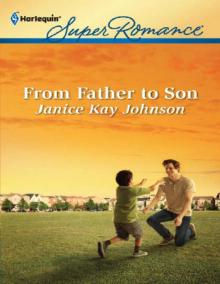 From Father to Son
From Father to Son All the Lost Little Horses (A Desperation Creek Novel Book 2)
All the Lost Little Horses (A Desperation Creek Novel Book 2)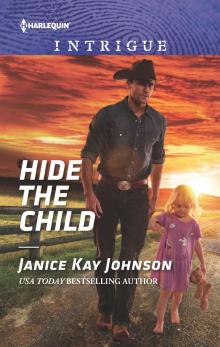 Hide the Child
Hide the Child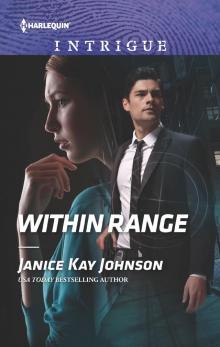 Within Range
Within Range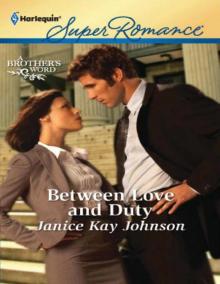 Between Love and Duty
Between Love and Duty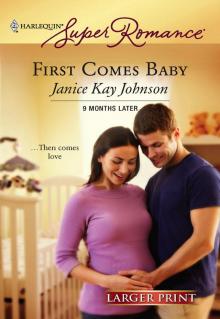 First Comes Baby
First Comes Baby Charlotte's Homecoming
Charlotte's Homecoming In A Heartbeat (HQR Superromance)
In A Heartbeat (HQR Superromance)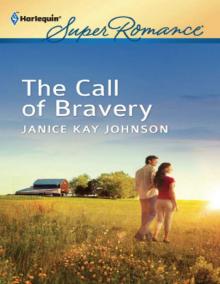 The Call of Bravery
The Call of Bravery In Hope's Shadow
In Hope's Shadow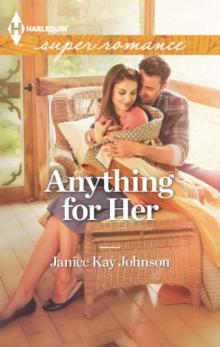 Anything for Her
Anything for Her Harlequin Superromance September 2014 - Bundle 1 of 2: This Good ManPromises Under the Peach TreeHusband by Choice
Harlequin Superromance September 2014 - Bundle 1 of 2: This Good ManPromises Under the Peach TreeHusband by Choice The Baby Agenda
The Baby Agenda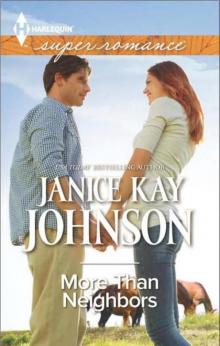 More Than Neighbors
More Than Neighbors Her Amish Protectors
Her Amish Protectors All That Remains
All That Remains Whisper of Revenge (A Cape Trouble Novel Book 4)
Whisper of Revenge (A Cape Trouble Novel Book 4)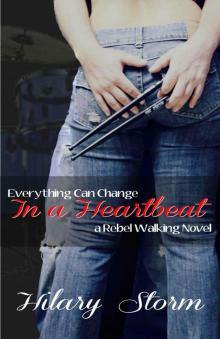 In a Heartbeat
In a Heartbeat A Mother's Claim
A Mother's Claim Because of a Girl
Because of a Girl Back Against the Wall
Back Against the Wall Dangerous Waters
Dangerous Waters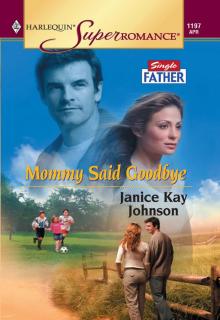 Mommy Said Goodbye
Mommy Said Goodbye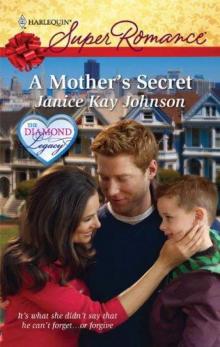 A Mother's Secret
A Mother's Secret See How She Runs (A Cape Trouble Novel Book 2)
See How She Runs (A Cape Trouble Novel Book 2) Plain Refuge
Plain Refuge Bringing Maddie Home
Bringing Maddie Home For the Girls' Sake
For the Girls' Sake Through the Sheriff's Eyes
Through the Sheriff's Eyes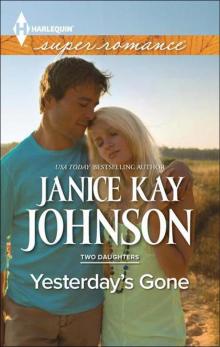 Yesterday's Gone (Two Daughters Book 1)
Yesterday's Gone (Two Daughters Book 1) All a Man Is
All a Man Is Harlequin Superromance January 2014 - Bundle 1 of 2: Everywhere She GoesA Promise for the BabyThat Summer at the Shore
Harlequin Superromance January 2014 - Bundle 1 of 2: Everywhere She GoesA Promise for the BabyThat Summer at the Shore No Matter What
No Matter What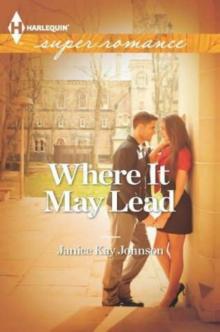 Wakefield College 01 - Where It May Lead
Wakefield College 01 - Where It May Lead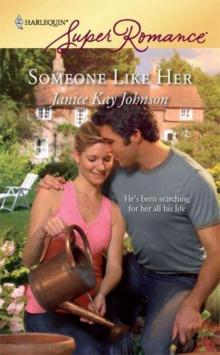 Someone Like Her
Someone Like Her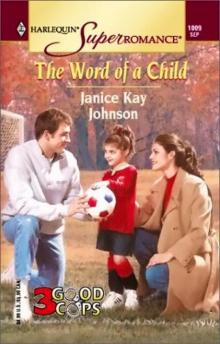 THE WORD OF A CHILD
THE WORD OF A CHILD Harlequin Superromance May 2016 Box Set
Harlequin Superromance May 2016 Box Set Open Secret
Open Secret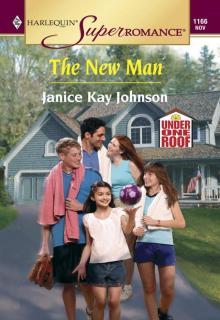 The New Man
The New Man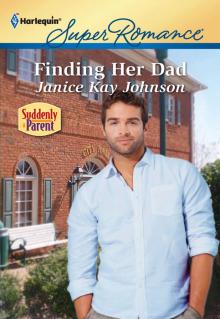 Finding Her Dad
Finding Her Dad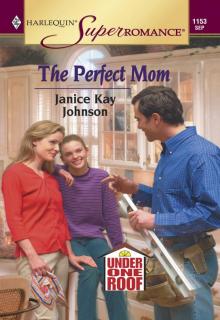 The Perfect Mom
The Perfect Mom All Through The House
All Through The House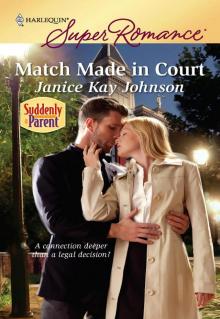 Match Made in Court
Match Made in Court Making Her Way Home
Making Her Way Home From This Day On
From This Day On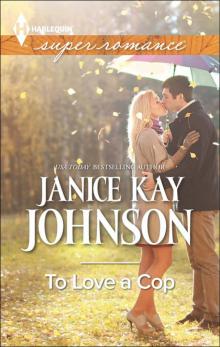 To Love a Cop
To Love a Cop The Hero's Redemption
The Hero's Redemption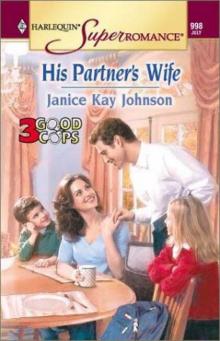 HIS PARTNER'S WIFE
HIS PARTNER'S WIFE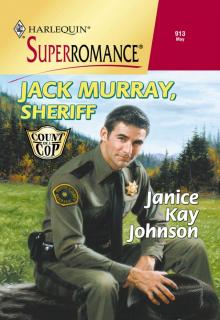 Jack Murray, Sheriff
Jack Murray, Sheriff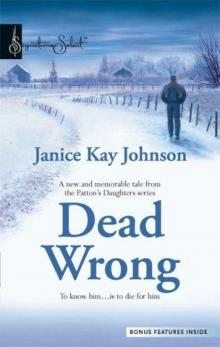 Dead Wrong
Dead Wrong Twisted Threads (A Cape Trouble Novel Book 3)
Twisted Threads (A Cape Trouble Novel Book 3)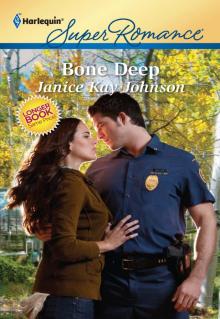 Bone Deep
Bone Deep The Closer He Gets
The Closer He Gets With Child
With Child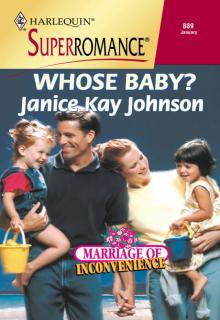 Whose Baby?
Whose Baby? Kids by Christmas
Kids by Christmas